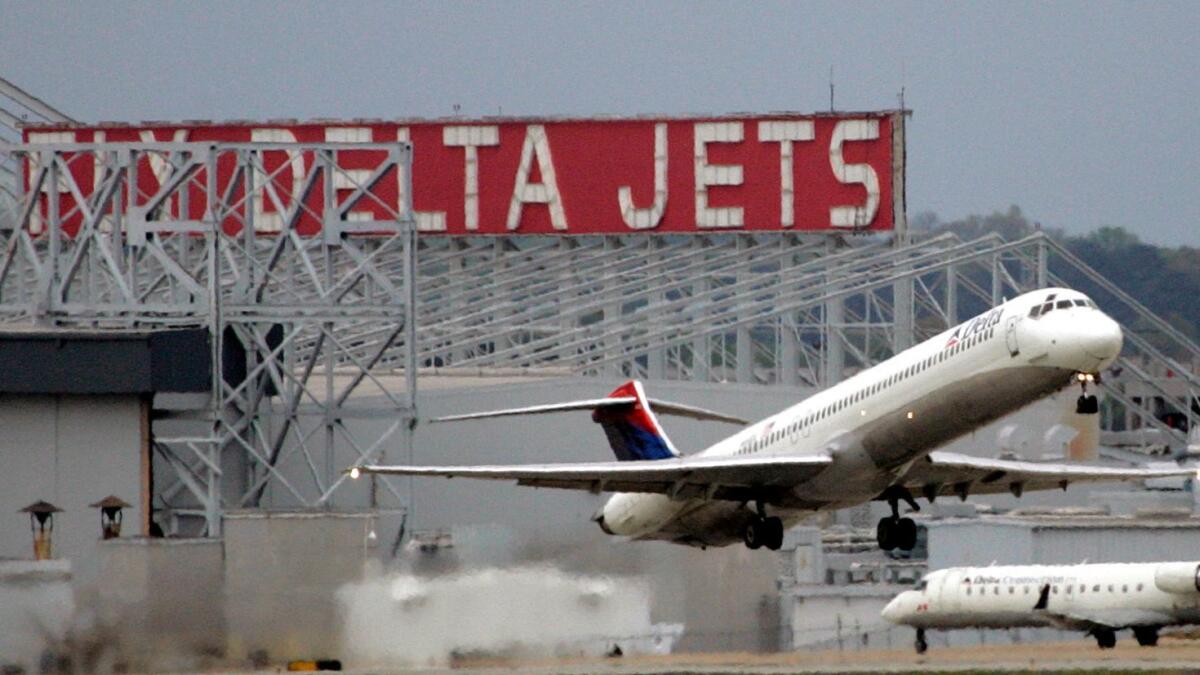Delta tried to find a middle ground on gun control — only to discover there wasn’t one

- Share via
It’s getting harder and harder to find neutral territory in America’s raging gun control debate. Just ask FedEx and Delta Air Lines, companies that — you’d think — don’t have anything to do with firearms.
Over the last two weeks, both have been under pressure to take a position on guns by two of the most powerful forces in U.S. politics right now: the National Rifle Assn., and the students of Marjory Stoneman Douglas High School.
The story starts — as many gun control stories now do — with the students.
After a gunman killed 17 people on Feb. 14 at their Parkland, Fla., school, the students turned their youthful energies toward reinvigorating the nation’s gun control movement, which has long been powered by outraged survivors and victims’ family members.
The students have rallied widespread support among left-leaning Americans, and they have used their social media skills to unleash a public backlash that seeks to marginalize and isolate the NRA, which says it has more than 5 million members.
Feeling a political wind growing at the students’ backs — and adopting tactics from recent social media campaigns — gun control advocates began pressuring prominent corporations to drop their discount deals for NRA members.
In a sign of how much the NRA has been put on the defensive, many of those companies cut ties.
FedEx tried to find a middle ground. The publicly traded shipping company issued a statement saying it supported an assault weapons ban and background checks for gun purchases, adding, “FedEx views assault rifles and large capacity magazines as an inherent danger to schools, workplaces and communities when such weapons are misused.”
But the company also said it would not drop NRA members’ discounted shipping rates, implying that the company might violate federal law by doing so.
Despite ostensibly dealing a blow to the NRA in calling for gun control, the company’s decision to defend its NRA discount drew blowback from gun control supporters. They have threatened a boycott against FedEx and other companies that have not dropped their relationships with the NRA.
On Saturday, Delta took a different path, notifying the NRA that the airline was dropping its contract for discounted fares for members traveling to the group’s 2018 annual meeting in Dallas.
The company was not throwing in its lot with the student activists, exactly. Facing growing public pressure, it was trying to extricate itself from a deteriorating situation as rapidly as possible.
“Delta’s decision reflects the airline’s neutral status in the current national debate over gun control amid recent school shootings,” the company said in its statement. “Out of respect for our customers and employees on both sides, Delta has taken this action to refrain from entering this debate and focus on its business.”
To make the point clear, Delta officials added: “Delta continues to support the 2nd Amendment.” (That’s not your average corporate declaration. Imagine if Holiday Inn issued a statement affirming it supports the 6th Amendment right to a speedy trial; if you have to say it, you’re probably in trouble.)
To gun control supporters, it was good enough. “To all companies who severed ties with the NRA, those personally affected by their influence on legislation thank you,” tweeted Emma Gonzalez, one of the most prominent Stoneman Douglas student activists.
But gun rights supporters were outraged, seeing the students’ campaign as an unjust attack on lawful gun owners.
“So @Delta, you REALLY want 5 million #NRA members like me, who have NEVER committed a mass shooting, to fly on your competition? Done,” tweeted one member, Jessie Jane Duff, earning more than 4,000 retweets. “Who ever thought this was a great PR campaign idea should be fired.”
This has been a common response for conservatives on the losing side of pressure campaigns in the past, but they have sometimes lacked the muscle that liberal activists have mustered to influence corporate boycotts.
Except Delta has a weak spot: tax breaks.
Headquartered in Atlanta, Delta has been trying to persuade Georgia’s Republican-controlled Legislature to pass a tax break on sales tax for jet fuel worth tens of millions of dollars.
So when Delta ended its discount for NRA members, that didn’t sit well with Georgia Republicans.
“If Delta is so flush that they don’t need NRA members’ hard-earned dollars, they can certainly do without the $40 million tax break they are asking GA taxpayers for,” tweeted former Republican state Sen. Rick Jeffares, who is now running for lieutenant governor.
Then, on Monday, Georgia’s current Republican lieutenant governor, Casey Cagle, who is also the president of the state Senate, threw down the gauntlet.
“I will kill any tax legislation that benefits @Delta unless the company changes its position and fully reinstates its relationship with @NRA,” tweeted Cagle, who recently boasted of having an “A+” rating from the NRA and of having endorsements from the gun organization. “Corporations cannot attack conservatives and expect us not to fight back.”
Soon after, the Atlanta Journal-Constitution reported that Georgia’s Senate had in effect blocked the tax bill.
Cagle’s office did not respond to a request for comment, but the NRA, tweeting the news, added a fist-bump emoji and the hashtags “#StandandFight” and “#SorryNotSorry.”
Delta — now being pressured to reinstate its relationship with the NRA, or lose out on tens of millions of dollars in breaks from Georgia taxpayers — did not respond to a request for comment.
Cagle’s decision to use his public office to pressure a private company over a political issue raised some concerns among legal observers.
“Of course, the government official has the right to free speech,” UC Berkeley law school dean Erwin Chemerinsky wrote in an email. “But punishing a company (or person) because of its political actions raises very serious First Amendment issues. It is hard to evaluate at this stage, but for the state to penalize Delta for its political stance would be very problematic under the First Amendment.”
The executive director of the American Civil Liberties Union of Georgia, Andrea Young, said in a statement that “politicians should not use taxpayer dollars to impose ideological litmus tests and punish organizations that express views that politicians dislike.”
Young added: “Amazon should take note,” a shot across the bow of officials hoping to woo the tech giant to Atlanta, one of Amazon’s 20 finalists for its second headquarters.
But Eugene Volokh, a professor at UCLA’s law school, thought the lieutenant governor had not overstepped his bounds.
“They may be playing political hardball, but that’s not a 1st Amendment violation,” Volokh said, adding that officials can’t regulate political speech, but they can regulate a company’s commercial activity.
“Contributing money for the purposes of speech is protected by the 1st Amendment. If the government can limit the use of money for purposes of speech, it will be limiting speech,” Volokh said.
But “spending money in other contexts — or choosing not to spend money, or choosing not to give a discount in an economic transaction — is completely regulable by the government, broadly,” Volokh said. “A decision about whether to give a discount … that is an economic decision that the government can act upon.”
But of course, in this political environment, every action creates a reaction, which creates a reaction, which creates a reaction.
“@Delta, as one of your most frequent flyers, know that the NY LG admires your principled stance,” tweeted Kathy Hochul, New York’s Democratic lieutenant governor. “Let’s continue our great relationship. NY is open for business & ❤’s Delta – move HQ to where you’re appreciated?”
Matt Pearce is a national reporter for The Times. Follow him on Twitter at @mattdpearce.
UPDATES:
Feb. 27, 3:15 p.m.: The article was updated with FedEx’s stance on an assault weapon ban.
This article was originally published Feb. 26 at 4:45 p.m.
More to Read
Sign up for Essential California
The most important California stories and recommendations in your inbox every morning.
You may occasionally receive promotional content from the Los Angeles Times.











